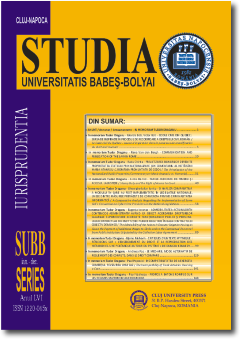DUE PROCESS OF LAW: DISTORTION OF INTERPRETATION
DUE PROCESS OF LAW: DISTORTION OF INTERPRETATION
Author(s): P. RathnaswamySubject(s): Law, Constitution, Jurisprudence
Published by: Studia Universitatis Babes-Bolyai
Keywords: Due Process Law; interpretation; distortion; judiciary; justices; skills; wisdom.
Summary/Abstract: Law is wisdom of justice and justice is a beautiful instrument of convenience. Analytical interpretation is the embodiment of justice failing which it is left to extinction. Justice is granted and it is not permanent. Bad interpretation causes injury to justice and there is continuity of injustice. An institution is the source of interpretation. Is it insufficient for the elected institution to deliver justice? Does it debar the mind to be the judicial mind to deliver justice? Is it essential for independent judiciary to grant justice? Who is benefitted from justice? Who is at loss where there is denial of justice? What democracy has delivered to justice when dictatorship is blamed? Does denial of justice mean injustice or non-availability of justice? Does due process of law ensure justice to all or to a few? Is the due process of law custodian of justice? Wisdom is the rule of mankind and justice is the branch of wisdom. The custodian of justice is rarely found except in court. If the court is bargained who will be the gainer and who will be at peril. People have struggled several centuries in search of justice and it is the hard earned wealth of humanity. Many believe that it is in rule book of court. Due process is the source of rationality which is born out of wisdom. Many refer justice to invisible existence of faith and belief and it has been abused for power. It is broken by court and it has established norms and rules and it has been in rule of law. Due process is an objective wisdom and it is placed for debate and denial. Slowly it is affirmed to begin with the principles of existence so that there is truth to survive. Mere words do not form law unless these are recognised and accepted.
Journal: Studia Universitatis Babes Bolyai - Iurisprudentia
- Issue Year: 63/2018
- Issue No: 1
- Page Range: 109-121
- Page Count: 13
- Language: English

